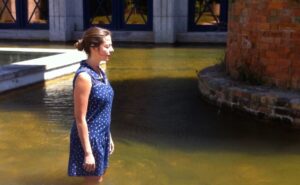
Italo-Brazilian born in São Paulo, Brazil, she has a PhD in Human Motricity, Dance, from the Faculty of Human Motricity, University of Lisbon. Dancer, Anthropologist and professor, she graduated in Brazilian and contemporary dances in formal and non-formal contexts of study. And between the two, Anthropology, from the University of Campinas and Social Sciences, from the University of São Paulo. She belongs to the staff of researchers at the Laboratory of Studies on Body, Art and Education at the Faculty of Education of the University of Campinas and to the research group on Ethnography and History of Artistic Practices and Languages of Africa, Federal University of São Paulo, as an artist and invited researcher.
As a dance artist, she worked and works in creative works as a choreographer, interpreter-creator, dancer and performer. As a contemporary dancer and performer, stands out the collaboration with Martim Pedroso & Emanuel Sciannamea (Portugal, 2012), Clarice Lima (Portugal, 2013) and Vera Mantero (Portugal, 2014). As a choreographer and dancer, in her own works within the scope of the Almada International Dance Festival (Portugal, 2012) and at the Mostra-Teatro, Centro Cultural Malaposta (Portugal, 2013). She regularly teaches contemporary dance and inclusive dance (Danceability method) with an emphasis on teaching-learning processes, for young people, adults and children, with or without special needs, in non-formal teaching contexts.
She is engaged with the following lines of research: Anthropology and Performance, Contemporary Dance, Dance-Theater, Instant Composition, Choreographic Thinking, Creation, Inclusive Dance and Somatic Education.
Certified trainer by the Scientific-Pedagogical Council for Continuing Education (Minho), currently belongs to the staff of the Directorate-General for Education (DGE) of teacher trainers in the Aesthetic and Artistic Education Program (PEEA) for the artistic areas of Dance.
Maíra Santos in her PhD in Dance (2019) reviewed contemporary dance, participating in the creative processes under which she worked with. The thesis, unanimously approved with distinction, brought other interpretations on important issues in the field of body arts, such as the notions of “presence”, “quality of movement”, “corporeality, “reflective arenas”, in addition to the complex – and yet poorly understood – body/mind relationship, movement/thought.